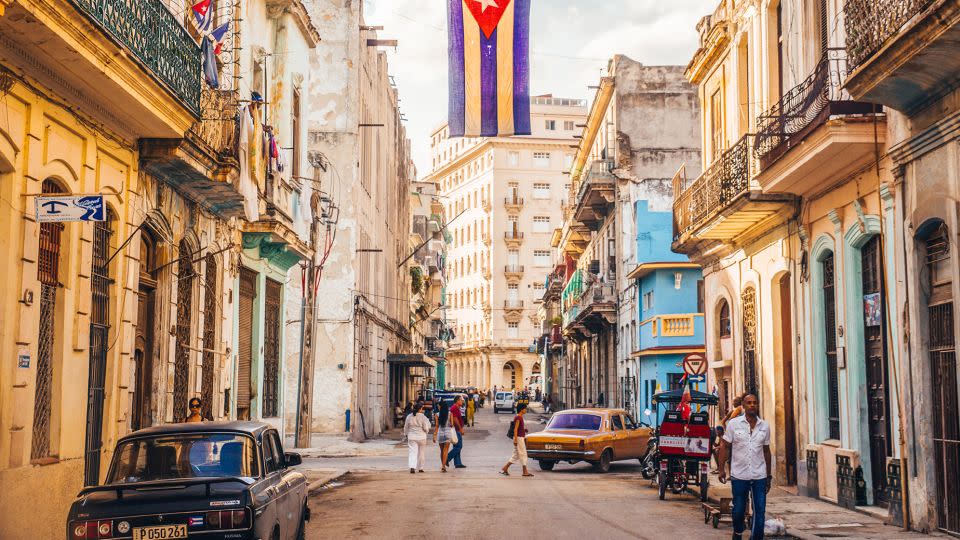Would you pay to go on vacation without your smartphone?
Could you survive a vacation without your mobile phone, resisting the compulsion to check emails, make a call, post a tweet or rely on the power of the all-mighty internet to get around in a foreign country?
Imagine not knowing how to tell the waiter what dish you want without a digital translator, or getting from A to B with an old-fashioned, dog-eared map.
For many, it would be hell. For others – one US-based travel company hopes – it would be such a rewarding detox experience that they’d pay good money for it.
FTLO Travel (For the Love of Travel), a venture aimed at millennial solo travelers, is launching phone-free trips in February 2024. It offers people the opportunity to ditch their device and enjoy a more immersive experience by interacting with locals and adjusting to their new surroundings.
Participants will go on five-day or week-long trips without their smartphone. No emails. No Instagram. No Google Maps. No translator.
“We hope people will embrace the challenge of traveling without a phone and that the device-less trip will result in richer experiences and deeper connections,” FTLO Travel founder and CEO Tara Cappel tells CNN.
“In today’s digital age we have become increasingly dependent on our smartphones, and it is negatively impacting our mental wellbeing and our ability to be present. By removing this distraction, travelers can fully engage with the destination they’re visiting, be more present and fully connect with the places they’re visiting.”

Digital-free destinations
In a world where the screens in our pockets are daily becoming more of a distraction, digital escapes are becoming increasingly attractive.
Earlier this year, Ulko-Tammio in Finland declared itself the world’s first phone-free tourist island, urging visitors to instead immerse themselves in the surrounding nature.
Many other hotels or places to stay, like the upscale Rancho La Puerta in Mexico, bill themselves as digital detox destinations, where the focus is on relaxation unencumbered by phones and computers.
FTLO Travel’s phone-free trips for groups of 14 start at $1,999 and will take place in Italy (Rome and Florence), Cuba (Havana), Portugal, Mexico, Costa Rica and Iceland. The longer seven-days trips are $3,200. Anyone can join from anywhere, as airfare is not included.
Leaving behind smartphones is the key rule, says Cappel. Trip participants who do bring them along are recommended to leave them behind in their luggage or shut them in the hotel’s safe box.
Those who give in to digital temptations and are caught using their mobiles could potentially be asked to leave the group if their action has an impact on their fellow travelers’ experiences.
Guests are encouraged to bring digital cameras to capture their memories though.
During their phone-free trip, participants will be given printed itineraries and maps, with details of any last-minute changes posted in the lobby. Trip leaders will be equipped with a mobile for logistics and for participants to use in emergencies.
According to Lamees Khorshid, a California-based psychologist specializing in peak performance, happiness and relationships, the benefits of cellphone-free travel are infinite.
“Not having pings and dings from a phone reduces elements of distraction, and allows for more relaxed attention in the here and now,” she tells CNN Travel.
“We lean more into spontaneity which can include random conversations with strangers or even getting lost and allowing for serendipity, chance encounters and unexpected surprises.”

‘Running on autopilot’
Switching phones off switches on the mind, she says.
“Because the mind can often run on autopilot, being more present, and using things like maps on paper allows for the brain to become switched on.”
Also, according to Khorshid, not having a phone can let you relax as others don’t have immediate access to you.
“It can help you lean into your experience without needing to feel accountable to someone or something else.”
Kim Baron, a 40-year-old digital analytics manager from Cleveland, has done six FTLO Travel trips so far, and though she hasn’t yet experienced a phone-free trip, she says she’ll be booking the Iceland and Havana one.
“It’s so important to be truly present while traveling and ensure you are soaking up the experience of food, culture, landscapes and the people”, she says.
In Italy, upcoming phone-less trips experiences will include cooking classes, truffle hunts, vineyard treks and exploring Siena’s picturesque contrade.
Portugal tours will feature pastéis de nata (custard tarts) cooking classes, a Lisbon private food tour, a day trip to Sintra on a typical three-wheeled tuk-tuk, a walking tour of Évora with entrance to the Chapel of Bones and a full-day boating experience.
In Iceland phone-free trippers will be treated to a Reykjavik food tour, spa experiences, exploration of glaciers, jeep rides and hikes to Breiðamerkurjökull and Vatnajokull ice caves, alongside tours of volcanic Diamond Beach.
Cappel, who has done several phone-free trips herself, expects the tours will particularly appeal to millennials who grew up in a world without smartphones and are nostalgic for those bygone unplugged days. They’re aimed at people aged 25-39.

Get lost
They might not appeal to everyone though, she says.
“Our goal is a return to pre-digital for those who knew what it was like, so not the Gen Z nor stressed-out people who are seeking to detox. Not having a phone will just boost their anxiety.”
The ideal tripper is someone who wants to overcome challenges and rediscover traditional travel techniques, says Cappel.
“Travel is complicated without a phone, figuring out where to get the info, how to get from A to B by asking people for directions. It makes you exit your comfort zone. If you rely on cell phones, you engage with the phone. You must pull yourself away to explore.”
Cappel says she recently went on a three-day phone-free trip in Prague with her team to test the new format, and says it was an amazing and engaging experience.
“I walked around the city for hours without a phone, got lost, talked to people. I love asking locals how to get somewhere, trying to communicate and overcome language barriers.
“I had the best day ever, it was energizing also on a psychological level, very relaxing even though I walked 18,000 steps.”
In 2018, Cappel embarked on a phone-free tour in Havana with her sister. The main
challenge for her was figuring out how to get from one place to another, how the bus system worked, hitch-hiking rides with locals and dealing with untranslatable restaurant menus.
“I had no digital translator, so was forced to interact with the waiters by asking them to show me the ingredients of a dish when I couldn’t understand what it was.
“Smartphones are like a drug, we launch social media apps like we are on auto-pilot. They distract us, the core of these trips is more about being present to learn the local culture, rather than a simple digital detox”, she says.
Cappel says she hopes that free-phone trips will help people learn to have occasional phone-free days as a structural part of their lives, during which they’re more “present” in everyday things.
Clarification: An earlier version of this story misstated what would happen if guests use their phones and how they will be briefed on activities.
For more CNN news and newsletters create an account at CNN.com


